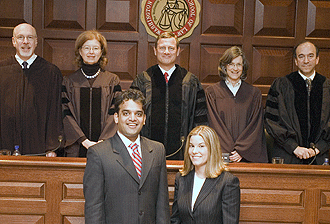Four finalists in the School of Law’s Wiley Rutledge Moot Court Competition experienced what most lawyers only dream of: arguing before Chief Justice of the United States John G. Roberts Jr.
“To be able to argue in front of one of the sharpest legal minds in the country was an experience I will never forget,” said Samir Kaushik, a second-year law student who argued the case with teammate and fellow second-year student Renee Waters at the Feb. 6 competition in the Bryan Cave Moot Courtroom of Anheuser-Busch Hall.

“It was an incredible honor to argue before Roberts,” Waters said. “There is no jurist for whom I have greater respect than the chief justice. It was an honor to be in his presence and to engage in dialogue with him and the four other jurists.”
Roberts, who presided over the competition, was joined on the panel by Karen Nelson Moore, judge on the U.S. Court of Appeals for the Sixth Circuit; law school alumna Catherine D. Perry, judge on the U.S. District Court, Eastern District of Missouri; David R. Herndon, judge on the U.S. District Court, Southern District of Illinois; and Richard J. Lazarus, professor at the Georgetown University Law Center.
After making what was described as a very difficult decision, the panel named Kaushik and Waters the competition winners. The other final team consisted of third-year students James Frazier and Daniel Rhoads.
“The organizers did a fantastic job bringing together five well-respected jurists to serve on the panel,” Kaushik said. “We were all challenged with thought-provoking questions from several different angles.”
Frazier was pleased that the panel took the competition so seriously. “The judges weren’t throwing out softballs — and that made the whole competition a pleasure,” he said.
A student-run Moot Court Board, chaired this year by third-year students Brad Keeton and Allison Scharf, oversees the annual competition and assists in selecting the legal topic.
Based on characters from the 2004 movie “Win a Date with Tad Hamilton,” this year’s case focused on the fictitious criminal appeal of a contest winner’s boyfriend who allegedly threatened a celebrity.
This type of competition is one of the most valuable experiences the law school has to offer, Waters said.
“There is a limit to how much a competition like this can simulate reality, but it’s a lot closer to what lawyers really do than the typical doctrinal classes,” she said. “It gives us students an idea of how thrilling actually practicing law can be.”
The law school has held moot court competitions since its founding in 1867. This year’s Wiley Rutledge Moot Court Competition began last fall with preliminary rounds in which nearly 100 second- and third-year law students participated in two-person teams.
Numerous judges and lawyers from the local legal community served as judges for the various rounds of the competition.
Prior to announcing the winners of the competition, Roberts presented second-year student Toneille Raglan with the Golden Gavel Award, which is given to the best oral advocate in the preliminary rounds.
He also named Derick Albers and Bryan Boyle, both second-year students, winners of the Golden Quill Award, which is presented for the best legal brief.
“The student litigants were outstanding,” said Jo Ellen Lewis, J.D., director of the legal practice program and senior lecturer in law, who served as faculty adviser for the competition along with Bill Dorothy, J.D., senior lecturer in law. “They worked very hard to prepare for the competition, and their hard work was evident in their performance. What makes their performance and preparation even more impressive is when you consider that they are also taking a full course load and one or more of the students actively participate on other moot court teams and competitions, the trial team and are editors and staff members of law journals.”
Frazier and Rhoads were impressed by the encouragement from the law school community.
“The most amazing thing about preparing for and participating in the finals was the goodness that we saw in people before, during and after the argument,” Rhoads said. “There are some really great people in the law school, and the sharing of good will was in a way as rewarding as the honor of arguing before the chief justice.”
Frazier agreed. “I’ve been overwhelmed by the kindness and genuine moral support of the other students, the faculty and the dean,” he said. “I hope we made them proud.”